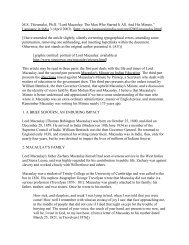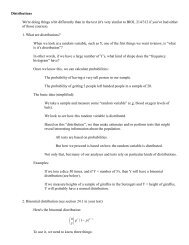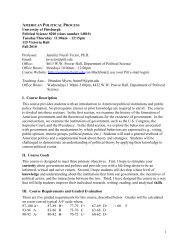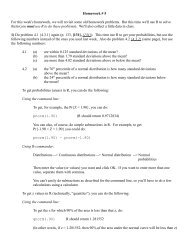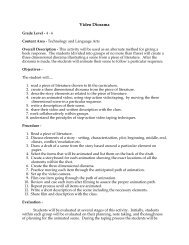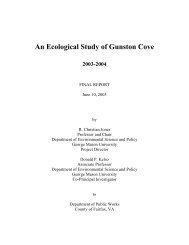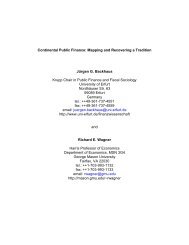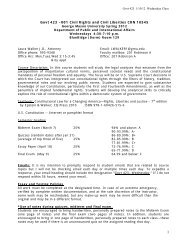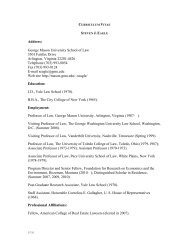"Pride and Prejudice in Pride and Prejudice" by Everett Zimmerman
"Pride and Prejudice in Pride and Prejudice" by Everett Zimmerman
"Pride and Prejudice in Pride and Prejudice" by Everett Zimmerman
Create successful ePaper yourself
Turn your PDF publications into a flip-book with our unique Google optimized e-Paper software.
68 N<strong>in</strong>eteenth-Century Fiction<br />
At times even the commentary presented <strong>by</strong> the narrator is so<br />
abundantly ironical that the authority of any po<strong>in</strong>t of view is<br />
cancelled, as when Wickham's false story of Darcy is spread:<br />
...every body was pleased to th<strong>in</strong>k how much they had always disliked<br />
Mr. Darcy before they had known anyth<strong>in</strong>g of the matter.<br />
Miss Bennet was the only creature who could suppose there might<br />
be any extenuat<strong>in</strong>g circumstances <strong>in</strong> the case, unknown to the society<br />
<strong>in</strong> Hertfordshire; her mild <strong>and</strong> steady c<strong>and</strong>our always pleaded for al-<br />
lowances, <strong>and</strong> urged the possibility of mistakes-but <strong>by</strong> everybody else<br />
Mr. Darcy was condemned as the worst of men (138).<br />
Those who judge Darcy are treated ironically: they are pleased<br />
to censure him. The only person who supports him is Jane Bennet,<br />
but although she is right, she has already been presented as unable<br />
to th<strong>in</strong>k evil of anyone, no matter what the circumstances. The<br />
authorial voice here leads the reader to a position from which<br />
judgment is impossible; only amused spectatorship is possible.<br />
Nevertheless, on occasions like this one, the reader is not entirely<br />
deprived of a moral perspective. Although he is shown the un-<br />
resolvable complexities of the situation, he is constantly made<br />
aware of the crucial moral problems <strong>by</strong> the characters of pride<br />
<strong>and</strong> prejudice.<br />
In the earlier parts of the book, whenever any pressure is built<br />
up lead<strong>in</strong>g to a direct clash or a serious moral choice or judgment,<br />
it tends to be dissipated <strong>in</strong> action, dialogue, or commentary. For<br />
example, Darcy's unwill<strong>in</strong>g attraction to Elizabeth <strong>and</strong> Eliza-<br />
beth's fasc<strong>in</strong>ated but clear dislike of Darcy seem <strong>in</strong>evitably to be<br />
lead<strong>in</strong>g toward a confrontation out of which will come a resolu-<br />
tion. For a time we get clearer than usual <strong>in</strong>sight <strong>in</strong>to Darcy with<br />
the suggestion of an approach<strong>in</strong>g climax, <strong>and</strong> when, on a walk,<br />
Darcy <strong>and</strong> Miss B<strong>in</strong>gley suddenly meet Elizabeth <strong>and</strong> Mrs. Hurst,<br />
Darcy behaves with a politeness revelatory of chang<strong>in</strong>g feel<strong>in</strong>gs.<br />
Elizabeth, however, immediately decl<strong>in</strong>es walk<strong>in</strong>g with them <strong>and</strong><br />
runs "gaily off (53). This <strong>in</strong>cident is characteristic of much of<br />
the early action. Forces do not meet <strong>and</strong> resolve. They constantly<br />
shift <strong>and</strong> dissipate rather than clash.<br />
A conversation between Darcy <strong>and</strong> Elizabeth shortly before<br />
Elizabeth leaves Netherfield illustrates these shift<strong>in</strong>g qualities <strong>in</strong><br />
the early dialogues (57-58). The reader can never accept any<br />
attitude or formulation as def<strong>in</strong>itive. As he has no vantage po<strong>in</strong>t



